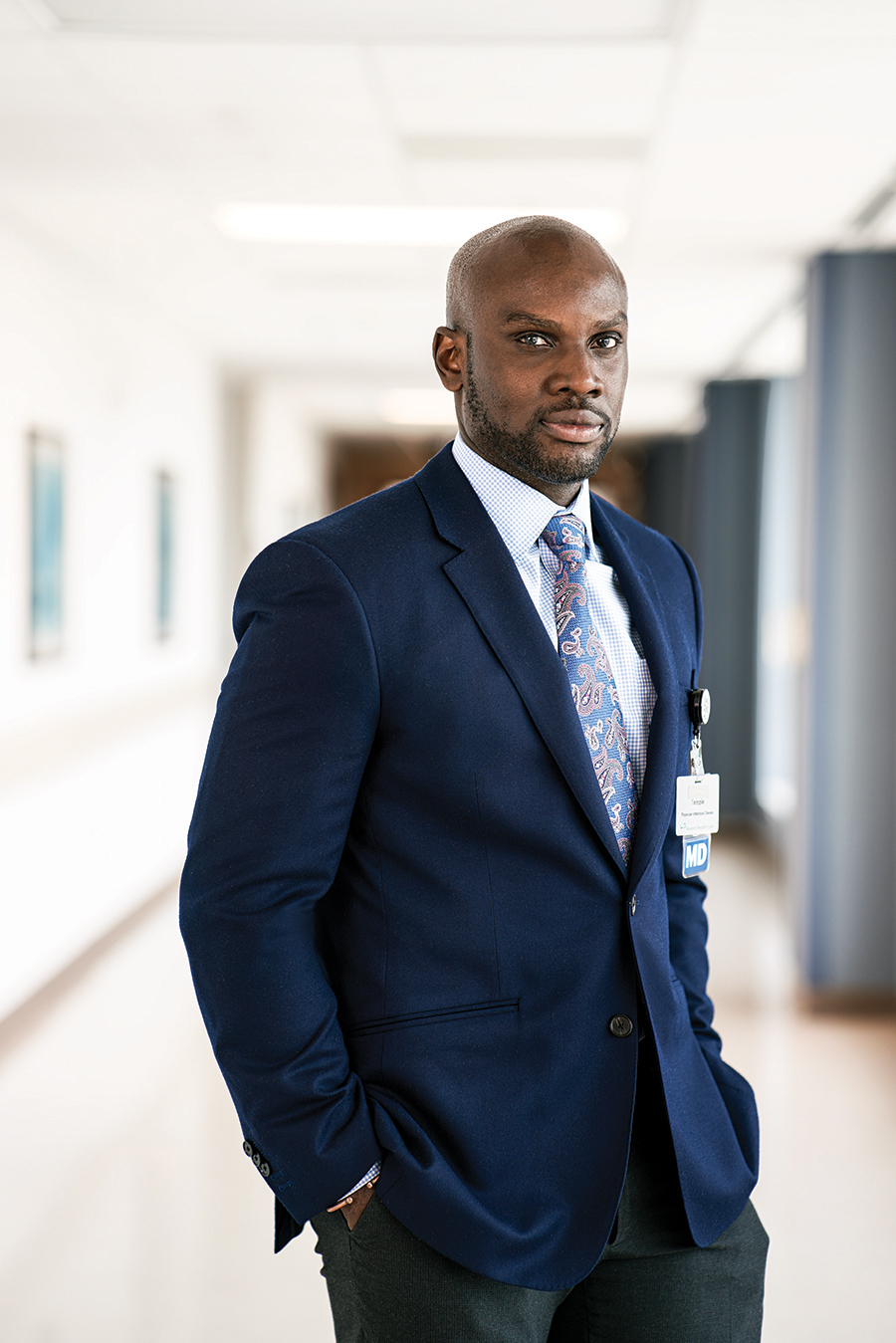Sherlock, M.D., Decodes Infectious-disease Mysteries
Brian Temple, BS’00, MS’01 (Metro)

(Photo: Kat Schleicher)
By Mary Ann Bautista
For Brian Temple, BS’00, MS’01 (Metro), an infectious disease (ID) physician at the Aurora Medical Center in Oshkosh, Wis., every day is a quest — to find answers, to better understand diseases and to heal his patients.
This was especially true during the early days of the COVID-19 pandemic, when Temple found himself at the forefront of the fast-spreading medical mystery. Faced with a virus unlike any other, “we were all forced to deal with our mortality and our fear of the unknown,” he says. Temple trusted his training and infection-prevention protocols, but everything the experts knew, or thought they knew, kept changing.
At the height of this uncertainty — when there were more questions than answers — Temple’s days were long and exhausting, and he often felt unappreciated. “It was tough to see so many people die because we couldn’t do anything about it,” Temple says. “We also dealt with misinformation, patients who thought they knew medicine more than we did and others who believed COVID wasn’t real.” But “seeing someone you thought would die walk out of the hospital” made it all worthwhile.
Finding the correct diagnosis and appropriate treatment for patients gives Temple much fulfillment. Each virus brings with it unique characteristics that need to be understood. “We’re like detectives because we’re often consulted to figure out what’s going on” with a patient, he says. The process from initial consult to diagnosis is not always a straight line, and he has often taken circuitous routes to find the right answer to a patient’s problem.
Temple remembers treating a patient who had a high fever and headaches with increased liver enzymes. “Admitted with sepsis and given broad antibiotics, the patient continued to worsen,” he says. Temple talked with the patient, did a physical exam and evaluated his labs. “He was eventually diagnosed with anaplasmosis [a bacterial disease transmitted to humans by a blacklegged tick or deer tick],” he adds. “I started him on doxycycline [an antibiotic] and noticed a significant improvement.”
Temple doesn’t only treat complex or contagious diseases — a common misconception about ID physicians. “Cases can range from a urinary tract infection to a necrotizing fasciitis (flesh-eating disease) or spinal/vertebral osteomyelitis (bone infection), post-travel infection or fever of unknown origin (FUO).” And “because we don’t deal with just one organ,” collaboration with other specialists is crucial.
Temple is always up for the challenge. “I love my job because no day is the same,” he says. Timely and relevant knowledge is power, so he regularly checks the IDSA (Infectious Diseases Society of America), CDC (Centers for Disease Control and Prevention) and WHO (World Health Organization) websites. “I get alerts each day from various journals and sites such as Medscape [which offer essential drug-and-disease information],” he added. He also meets with the Aurora Medical Center’s infection preventionist to ensure there are no outbreaks within their facility.
Preparation is half the battle. Temple believes it takes a certain kind of person to do the job well: one who is ready to work hard — oftentimes unnoticed — and is committed to a life of continuous learning. “ID medicine is tough, but it can be very rewarding,” he says.
FORMATIVE FELLOWSHIPS
“During my infectious disease and research fellowships, I cared for HIV- and tuberculosis-infected patients in Sierra Leone.”
MR. PRESIDENT
As president of the Aurora Medical Center’s Medical Leadership Council, Temple represents the medical staff to administration and serves as their voice.
THANKS, FDU!
“FDU gave me a strong science background and helped nurture my love for learning.” He also found lifelong friends at FDU when he joined the Alpha Phi Alpha Fraternity, Inc.
BABY LOVE
“Since my wife and I had our first child, I de-stress by looking into his eyes in amazement.”
GIVING BACK
“I support organizations that help change the narrative — Big Brothers Big Sisters of America, the Boy Scouts of America and the Smithsonian National Museum of African American History.”